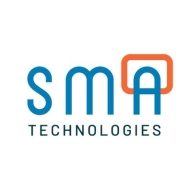


Rocket Zena and VisualCron are automation and scheduling tools with unique strengths. VisualCron has an edge due to its advanced features that are highly valued by users, despite being more expensive.
Features: Rocket Zena provides real-time collaboration tools, customizable dashboards, and an easy setup process. Its intuitive interface and flexibility are key highlights. VisualCron excels with a wide range of integration capabilities, robust scheduling options, and comprehensive task automation, offering flexibility and depth.
Room for Improvement: Rocket Zena can enhance its integration capabilities, expand its feature set for complex tasks, and provide more advanced automation functionalities. VisualCron could improve its user interface, simplify the deployment process, and offer more straightforward pricing options.
Ease of Deployment and Customer Service: Rocket Zena's deployment process is straightforward, and customer support is readily available, making for a seamless start. VisualCron, though more complex to implement, provides comprehensive support and documentation, which aids in managing complex setups and customizations.
Pricing and ROI: Rocket Zena offers low initial setup costs, appealing to budget-conscious businesses. It provides good ROI for organizations focusing on affordability. VisualCron, while having a higher initial cost, delivers significant long-term value through its extensive feature set and potential efficiency gains, offering solid ROI for those needing in-depth automation.
| Product | Market Share (%) |
|---|---|
| JAMS | 2.6% |
| VisualCron | 1.4% |
| Rocket Zena | 2.5% |
| Other | 93.5% |


| Company Size | Count |
|---|---|
| Small Business | 11 |
| Midsize Enterprise | 8 |
| Large Enterprise | 18 |
| Company Size | Count |
|---|---|
| Small Business | 3 |
| Large Enterprise | 6 |
| Company Size | Count |
|---|---|
| Small Business | 5 |
| Midsize Enterprise | 1 |
| Large Enterprise | 5 |
JAMS is an automation and job scheduling solution designed for workflow optimization, catering to businesses large and small with flexible licensing and integration options.
Offering both Core and Advanced packages, JAMS supports a range of environments from small teams to large-scale operations. Its standout features include integration with platforms like PowerShell, SQL, and SAP, coupled with capabilities such as dependency management and natural language scheduling. JAMS simplifies job management, centralizes workflows, and boosts productivity with its robust automation features. Customizable workflows and insightful logging make it adaptable for diverse needs, supported by responsive customer service ensuring seamless operations.
What are JAMS's key features?In industries, JAMS is employed for automating workflows and managing batch jobs. Organizations utilize it for SSIS, SQL Server tasks, file transfers, and integrating with vendor systems, achieving efficient file automation and data management. Scheduler enables precise execution of thousands of tasks daily, enhancing operational efficiency.
Rocket Zena offers scheduling and dependency mapping, intuitive interface, and containerized deployment. It simplifies workflow automation, enhancing efficiency across platforms.
Rocket Zena's strengths lie in its scheduling capabilities, graphical interface, and efficient deployment. It supports users in task management with cross-platform scheduling, streamlining repetitive tasks through automation. The web-based client facilitates process visualization and workflow management, while the notification system enhances task handling. Users can manage mainframe, Linux, and Windows environments while integrating with SAP and Oracle, ensuring comprehensive automation and efficient job execution.
What are the key features of Rocket Zena?In industries like finance and manufacturing, Rocket Zena plays a vital role in scheduling batch jobs and automating file transfers. It helps adapt task scheduling to business calendars and integrate with existing platforms, ensuring a smooth workflow that meets business objectives.
VisualCron offers task automation through a visual interface, eliminating the need for programming skills. With capabilities like alerting and variable usage, users benefit from integration with databases, timely task execution, and cross-platform operations.
VisualCron empowers users by simplifying complex workflows. It allows seamless task automation through features like interactive scheduling and role-based operations. Users appreciate its integration capabilities, replacing multiple tools with a comprehensive automation solution. The support system ensures quick assistance, making it a reliable choice for workflow visualization and task execution. However, areas like error handling and interface design require enhancements for improved user experience.
What are the key features of VisualCron?Organizations leverage VisualCron in industries like finance and logistics to automate tasks such as encryption and secure file transfers. It's also integral in managing data operations, facilitating communications between systems, and executing SQL jobs, enhancing operational efficiency across sectors.
We monitor all Workload Automation reviews to prevent fraudulent reviews and keep review quality high. We do not post reviews by company employees or direct competitors. We validate each review for authenticity via cross-reference with LinkedIn, and personal follow-up with the reviewer when necessary.